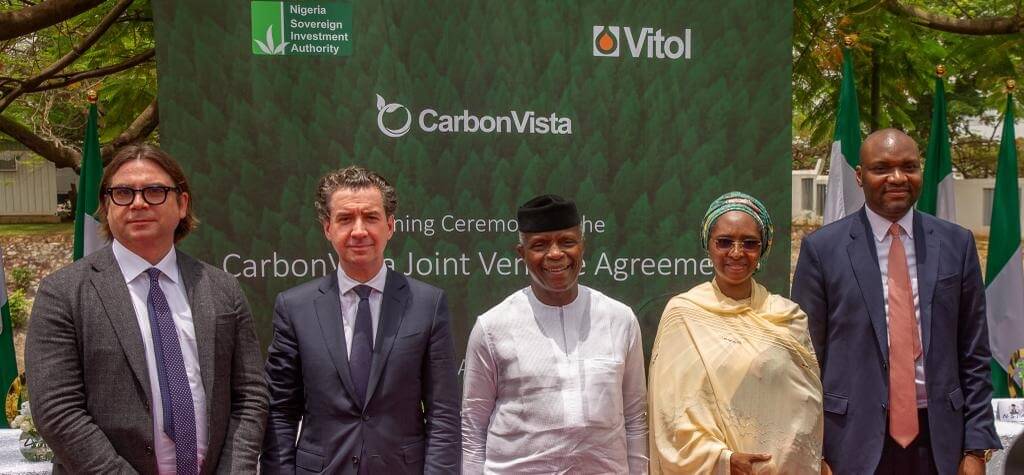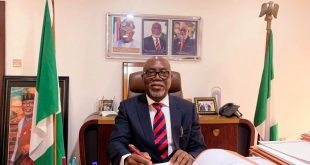
The Nigeria Sovereign Investment Authority managers of Nigeria’s Sovereign Wealth Fund, and Vitol have completed a joint venture agreement to invest in a range of carbon avoidance and removals projects and are in the process of reaching a final investment decision on the first projects.
An initial US$50m has been committed, with a view to attracting new investors as the partners develop the project pipeline.
The JV will commence with projects in Nigeria, partnering with local firms with proven track records of successfully delivering high-quality projects, combining carbon offsetting with social outcomes that contribute to the attainment of UN Sustainable Development Goals.
Its investments will focus on various sectors including infrastructure, agriculture, and energy.
This initiative will seek to mobilize capital from funding partners to the voluntary carbon market in support of the effort of the
Nigerian government toward a more equitable energy transition for Africa.
The JV’s first investment will be in a household energy efficiency programme including improved efficiency, clean cooking and water filtration devices.
Approximately one billion people in sub-Saharan Africa rely on wood and charcoal for daily cooking and water purification.
This has been identified as a major cause of the nearly four million hectares of annual deforestation and degradation across the continent.
Providing rural households with efficient household devices significantly reduces wood fuel consumption and related greenhouse gas emissions and household air pollution whilst also saving communities money and time.
The initial scope of the project is to deploy up to 200,000 devices of each.
The Managing Director, and Chief Executive Officer, NSIA, Aminu Umar-Sadiq, said that given the NSIA’s mandate as the custodian of economic resources for the next generation of Nigerians, tackling climate risks that have adverse effects on our environment is core to the implicit objectives of the Authority.
To achieve this objective, the NSIA Boss said the Authority has implemented a three-fold sustainability strategy that firstly addresses sustainability at an institutional level, secondly embeds ESG practices in its investment process while advancing climate solutions that help to lower Nigeria’s carbon footprint, and lastly builds partnerships with other institutions to support
Nigeria’s overall goal of achieving net-zero emissions by 2060.
He said the NSIA acknowledges the significant resources required to undertake green projects that deliver appreciable social impact and have partnered with Vitol to set up CarbonVista as a platform for developing quality projects and attracting third-party capital.
Over the next few months, he said the NSIA will roll out projects to set the standard for ESG investment in Nigeria.
These projects, he added, will be carefully selected, partnering with local institutions that have proven track records of successfully delivering high-quality projects.
He said: ” The unique challenges posed by climate change calls for deliberate and strategic action at all levels. At the NSIA, we developed a 3-prong strategy for delivering our ESG and climate finance objectives. One of the thrusts of this approach involves building partnerships with like-minded institutions to support Nigeria’s overall goal of achieving net-zero emissions by 2060. Against this backdrop, we are partnering with Vitol, a leader in the energy sector with a global presence, to establish CarbonVista, a carbon avoidance and removal entity, to support the delivery of a clean energy future for Nigeria and indeed the continent.”
“CarbonVista adopts a pragmatic approach to these challenges. We are pleased to be leading this novel path for delivering Nigeria’s net-zero targets.”
Michael Curran, Head of Environmental Products, Vitol said: “Our partnership with NSIA, in support of Nigeria’s efforts to cut GHG emissions, aligns with Vitol’s commitment to subSaharan Africa.
“The projects delivered through the JV will focus on ensuring social benefits alongside the highest carbon offsetting standards.
“We have invested in high-quality carbon-mitigating projects globally for over a decade, addressing critical environmental and climate threats.
“This joint venture should be a catalyst in the creation of the domestic emissions trading scheme, a pioneer in the Africa Carbon Market Initiative (ACMI) and will create a pipeline of high-quality credits into the global voluntary carbon markets.
“When combined with a comprehensive corporate energy transition strategy, offsetting will play a key role in meeting the Paris Climate Agreement objectives and contribute toward the UN Sustainable Development Goals.”
The Minister of Finance, Budget and National Planning, Mrs Zainab Ahmed said the NSIA’s unwavering commitment to promoting sustainable development in Nigeria is evident through its extensive portfolio of successful projects.
According to her, CarbonVista represents yet another milestone in NSIA’s mission to build critical infrastructure and create investment opportunities that drive economic growth and development in Nigeria.
She said, “I am particularly pleased that this initiative is a Joint Venture between two important players in their respective fields, targeting one common goal: to invest an initial $50 million towards developing sustainability-driven projects in Nigeria.
“This venture is expected to attract additional capital and leverage the large pool of ESG resources to create new businesses and develop the voluntary carbon market in Nigeria. It clearly demonstrates the power of partnerships in driving positive change toward sustainable development.
“As the supervising Minister of this institution, NSIA’s great strides continue to represent critical building blocks in support of our aspirations for the Ministry of Finance, Budget, and National planning and the country.
“More fundamentally, I am pleased with the prospects of a domestic carbon market in Nigeria and its opportunities for sustainable investment and economic growth.”
The finance minister stated further that a thriving carbon market can create new opportunities for businesses and investors while driving the country’s transition towards a low-carbon economy.
“With this in mind, CarbonVista must work closely with the National Council on Climate Change (NCCC) to develop the domestic carbon market.
“We must also collaborate with strategic partners such as Sustainable Energy for All (SEForAll) and Africa Carbon Markets Initiative (ACMI) to achieve our goals. By working together, we can create a sustainable future for Nigeria, where economic growth is achieved in harmony with environmental and social sustainability,” she added.
The Minister added that the Federal Government remains committed to fostering a resilient Net Zero economy developed by dedicated partners like NSIA and Vitol.
As such, Ahmed said the government will continue to support this venture as it seeks to place Nigeria at the forefront of tackling climate change while achieving sustainable social and economic outcomes.
“We recognize that climate change is a global challenge that requires collective action, and we are committed to playing our part in the global effort to address this challenge.
“Through initiatives like CarbonVista, we are creating an enabling environment for sustainable investment in Nigeria, contributing to the country’s economic development while protecting our environment for future generations, she concluded.
Speaking as the host, the Vice President, Prof Yemi Osibajo, SAN, counseled that if Nigeria is to develop capacity to be green factory of the world, the country ought to begin from where we are and not be fixated on playing catch up.
‘Our focus should be to do something revolutionary and different by taking advantage of the young population, deploy green manufacturing on a scale that can position Nigeria as the global green factory and green power of the world. He added that ‘fossil rich countries like Nigeria still find themselves in a situation where they still need to use gas but must explore other areas of renewable energy’, said the Vice President.
 DailyrecordNg …Nigeria's hottest news blog
DailyrecordNg …Nigeria's hottest news blog







